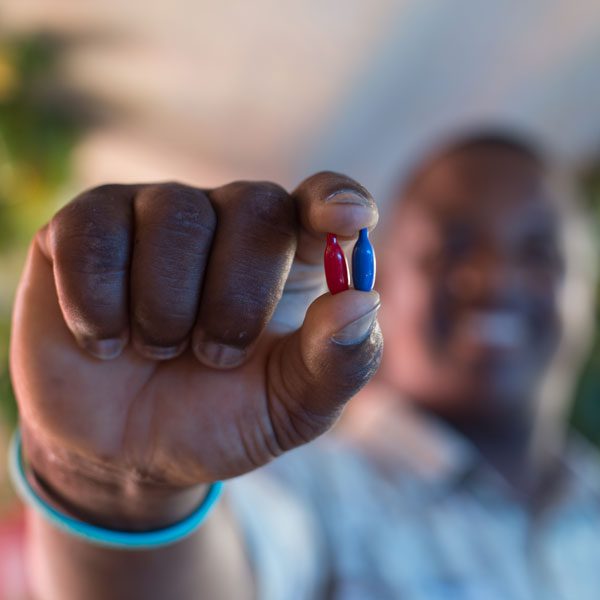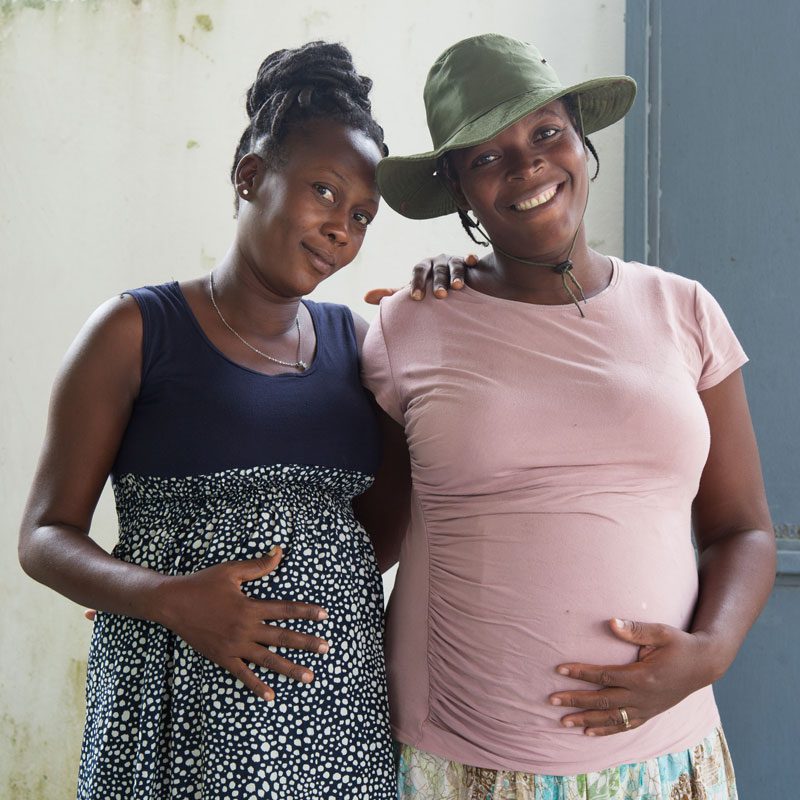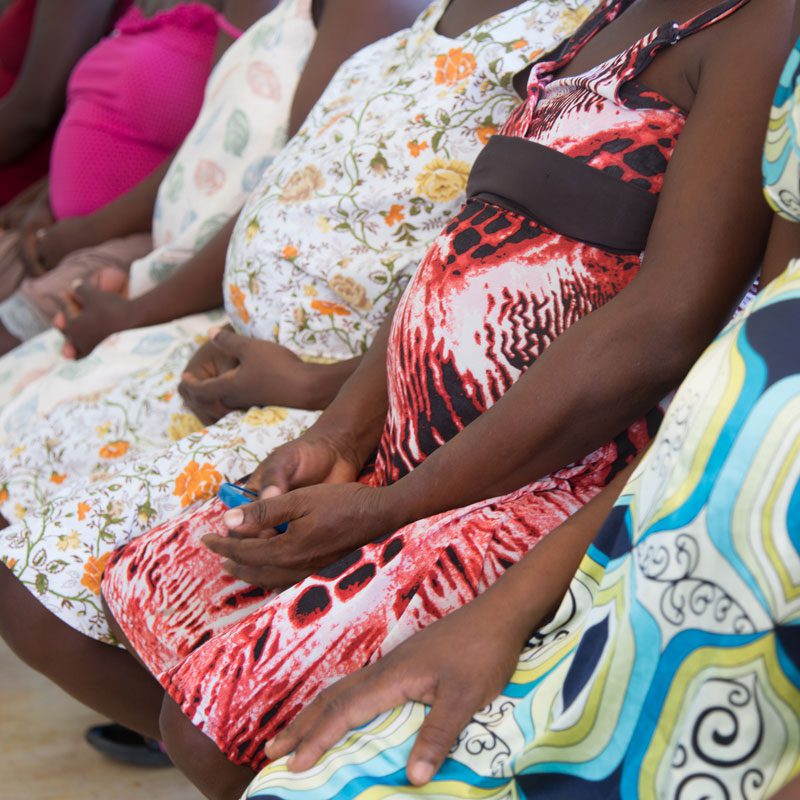Case Study
Vitamin Angels Addresses Malnutrition in Haiti
Vitamin Angels works collaboratively to deliver high-impact nutrition interventions to underserved pregnant women, infants, and children under five across Haiti.
Published: October 2023


Our Annual Reach in Haiti*
Pregnant Women & Babies
135,000 with UNIMMAP MMS
Children Under 5
1.5 million with vitamin A and deworming treatment
National Coverage
46 partners across all 10 provinces
*Reach is based on Vitamin Angels’ shipments that were largely distributed in 2023.
Our Team
- Minaud Dacius, MPH, Country Director
- Rutchilia G. Bleus, Program Coordinator, M&E
- Elizabeth Carrera, Senior Program Officer, Latin America and the Caribbean
Compounding Crisis
Haiti has one of the poorest economies worldwide[i] and continues to contend with rising levels of poverty, political instability, violence, and insecurity.
Public Health Challenges
CHILD HEALTH
1 in 5 children under the age of five suffer from stunting[ii]
MATERNAL HEALTH
Nearly half of all pregnant women are affected by anemia, and the national maternal mortality rate is among the highest in the Western Hemisphere.[iii],[iv],[v]
Since 2008, Vitamin Angels has been delivering nutrition solutions in Haiti that address malnutrition with partners, including government, local nonprofits, community organizations, and academic institutions.
Vitamin Angels collaborative efforts enhance maternal, infant and child services and improve health
Despite rising levels of political and environmental instability, Vitamin Angels has built a strong network of program and technical partners, including the Ministry of Public Health and Population of Haiti (MSPP). We have partners in every province within the country, allowing us to uplift and amplify the work our partners are doing to enhance maternal, infant, and young child support across the entire nation. Additionally, we have collaborated with various governmental and non-governmental partners in Haiti, including the MSPP, the Haitian Health Foundation, and academic research institutions to conduct research and test different strategies to improve maternal, infant, and young child health.

The success of Vitamin Angels’ programs in Haiti can be attributed to the strength of their diverse partnerships and their continued commitment to public health.”
Elizabeth Carrera, Senior Program Officer, Latin America and the Caribbean
Our Approach
Our Work has a positive and scalable impact in underserved communities.

Program Summary
Vitamin Angels Implements a Variety of Tactics to Achieve Our Objectives
Distributing Evidence-Based Nutrition Interventions
Vitamin Angels delivers a complete package of nutrition interventions to improve nutrition during the critical period between pregnancy and five years of age. We provide:
- Multiple micronutrient supplementation (MMS)—also known as prenatal multivitamins—to improve pregnancy and birth outcomes
- Vitamin A Supplementation and Deworming (VAS+D) for children under age 5. Vitamin A supports healthy growth and development, a stronger immune system, and healthy vision, which is often paired with deworming to rid children of parasitic intestinal worms and allow a child to better absorb critical nutrients, including vitamin A.
We also deliver learning solutions, technical support, and innovative supply chain solutions to ensure mothers, infants, and young children in Haiti maintain access despite road blocks, or sometimes unsafe or harsh environments.
Building Consensus
In addition to nonprofit and community partners, we regularly collaborate with a range of technical stakeholders, government partners, and local initiatives and working groups in Haiti like the nutrition technical committee led by the Ministry of Public Health and Population of Haiti (MSPP).
The convening of stakeholders and technical advisors helps to build consensus and establish better health equity and a welcoming environment for underserved pregnant women, infants, and children within Haiti.
Contributing to Research
We collaborate with various governmental and non-governmental partners in Haiti, including the MSPP, the Haitian Health Foundation, and academic research institutions to test different strategies to improve uptake and adherence to MMS among pregnant women.
Working Addresses Barriers
Haitians have experienced increased challenges due to COVID-19 and the deteriorating security context. Vitamin Angels Haiti continues to connect program partners with essential nutrition interventions and services and has remained nimble in the face of these challenges, implementing new innovative strategies.
Our Efforts
Using a collaborative and region-specific approach, Vitamin Angels is committed to delivering effective evidence based nutrition interventions and technical assistance, and raising awareness to improve the health of underserved pregnant women, infants, and young children in Haiti.

Success Stories
Program Partner Hope for Haiti Connects Pregnant Women with MMS
Since 2009, Vitamin Angels has partnered with Hope for Haiti to provide nutritional support, including MMS, to pregnant women in rural areas, promoting healthier pregnancies. Francelaine and Hermite, best friends expecting their second children receiving prenatal checkups and MMS from Hope for Haiti.
Through this partnership, Hope for Haiti expects to reach 7,560 pregnant women with MMS by 2023.
Adapting to Evolving Challenges
In recent years, political instability and increasing violence have yielded new challenges that pose direct logistical challenges to our ongoing efforts. Ground travel between the capital, Port au Prince, and the rest of the country is virtually impossible due to road blocks and gang violence.
To overcome these obstacles and continue reaching women and children with essential nutrition interventions, Vitamin Angels’ Haiti team has adapted by developing and implementing creative solutions. For example, this year we have partnered with the MOH to secure UN helicopters to transfer product to otherwise inaccessible areas. It is through this type of collaboration, commitment, and innovation that the Vitamin Angels Haiti team has been able to maintain steady and secure support for underserved pregnant women, infants, and children in Haiti.
Our Commitment
Vitamin Angels’ Haiti team continuously adapts and implements creative solutions to logistical challenges.
Our Future
Haiti continues to face a challenging path forward but the Vitamin Angels team is working to develop agile approaches that support:
- Scale-up our social behavior change (SBC) strategy for toward optimal uptake and adherence of MMS among pregnant women,
- Build stronger partnerships by increasing communication and engagement with existing and new program partners, and
- Integrate and expand the availability of evidence-based nutrition interventions within the local context, including by adapting and evolving our logistics capacity.
What’s Next
Vitamin Angels will take a multi- faceted approach to expand the scope and quality of products and services offered.

Success Stories
Heartline Maternity Care Bridges the Gap Between Nutrition and Maternal Care
Due to their economic status, many women in the Port-au-Prince area lack adequate nutrition during pregnancy. In response, Heartline Maternity Center brings their pregnant clients together, offering high-protein meals, nutrition education classes, and MMS distributions. This approach also promotes ongoing MMS adherence. For those unable to travel, home visits are arranged. Following delivery, mothers and their babies receive continuing care, services, and classes throughout early childhood.
Through this partnership, Heartline Ministry has reached over 22,000 pregnant women and their babies with MMS, educational materials, and technical support.
[i] The World Bank. Haiti Overview. https://www.worldbank.org/en/country/haiti/overview
[ii] The Lancet Global Health. Addressing the Child and Maternal Mortality Crisis in Haiti through a Central Referral Hospital Providing Countrywide Care. https://www.ncbi.nlm.nih.gov/pmc/articles/PMC4867827/#b1-permj20_2p0059
[iii] The World Bank. https://data.worldbank.org/indicator/SH.PRG.ANEM?locations=HT
[iv] The World Bank. https://data.worldbank.org/indicator/SH.STA.MMRT
[v] CDC: https://www.cdc.gov/globalhealth/countries/haiti/default.htm
